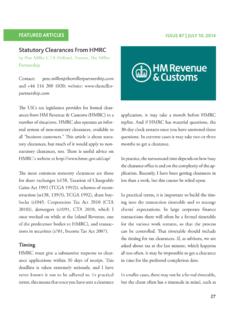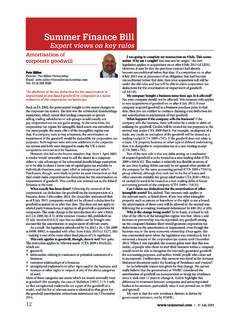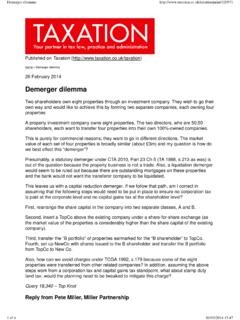Transcription of Taxing distributions, naturally! - …
1 Taxing distributions, naturally! Published on Taxation ( ). Home > Taxing distributions, naturally! Taxing distributions, naturally! Posted: 04 August 2010. Authors: PETE MILLER [1]. Issue: <a href="/taxation/node/20776">Vol 166, Issue 4266</a> [2]. Categories: Analysis [3], Features [4], CT [5]. PETE MILLER gives a guided tour of the new legislation relating to distributions KEY POINTS. UK and non-UK distributions were taxed differently. What is a distribution of a capital nature? Conflict between two new sections. Companies can disregard the new rules for distributions made before 22 June 2010. The new regime for the taxation of distributions was introduced in CTA 2009, Sch 9A [6] from 1. July 2009. Further changes are proposed for the third Finance Act of 2010 and draft legislation has been published on the HM Treasury website [7]. The new legislation is intended to clarify the position in respect of distributions of a capital nature' and to ensure that they are taxed in line with previous expectations.
2 In this article, we shall look at whether these aims are achieved. What went before Back in the good old days, if a company received a distribution from a UK company, it was tax free, under TA 1988, s 208 [8] (and, briefly, CTA 2009, s 1285 [9] before it was repealed). This legislation did not distinguish between income distributions or distributions of a capital nature. However, there was a back-stop, in that capital distributions' were (and still are) taxed as part disposals of the shares under the capital gains legislation at TCGA 1992, s 122 [10]. A capital distribution is defined in s 122(5) [10] as being effectively any distribution that is not taxed as income. As a result, s 122 [10] generally only applied to distributions in a winding up of a company. In contrast, distributions from a non-UK resident company were taxed as income, with an appropriate credit given for tax already suffered. It was this difference of treatment between distributions arising from a UK company and those arising from a non-UK company that was challenged as being potentially discriminatory and contrary to EC law.
3 It was as a result if this 1 of 4 06/07/2012 18:09. Taxing distributions, naturally! that CTA 2009, Part 9A [6] was originally introduced. What went wrong? The intention of part 9A [6] was to exempt from taxation the vast majority of distributions received, whether from UK or non-UK companies. Part 9A [6] works by deeming all distributions to be prima facie chargeable to corporation tax, but then exempting most of them by having very widely defined classes of distribution that will not be chargeable. The problem is that s 931A(2) CTA 2009 [11] specifically states that part 9A [6] does not apply in the case of a distribution of a capital nature'. What this means is that a normal income distribution, such as a dividend, would usually be exempt, regardless of the source, but distributions of a capital nature' are not within part 9A [6], and are hence outside the income charging regime. So they are likely to be charged to corporation tax on chargeable gains under TCGA 1992, s 122 [10].
4 Two points arise from this: first, what is a distribution of a capital nature? Second, was it Parliament's intention that the new legislation should force distributions of a capital nature into the capital gains charge where, under the previous regime, such distributions had usually been exempt under TA 1988, s 208 [8] ICTA (or CTA 2009, s 1285 [9])? The speculation as to what was a distribution of a capital nature' has been the subject of a number of articles in the tax press over the last 15 months or so. However, this speculation was rendered otiose by a ministerial statement on 24 February 2009 [12], promising to introduce legislation with a view to restoring previous expectations about the way that distributions are taxed'. The amending legislation is to be retroactive, with an opt out so that no company should be disadvantaged by the change. The new Government is now carrying out that promise. The new legislation The draft amendments in the new legislation are relatively short and the crucial change is the repeal of s 931A(2) [11], which takes distributions of a capital nature out of the scope of part 9A.
5 [6], so that part 9A [6] applies to all company distributions. By itself, this is arguably sufficient to ensure that the previous expectations as to the treatment of a dividend receipt are restored. However, the draft legislation goes slightly further in a number of areas. We have a new CTA 2010, s 1027A (part of chapter 2 Part 23 of this Act which covers the meaning of distribution'), which ensures that distributions paid out of a distributable reserve that was created by a company reducing its share capital (under Companies Act 2006, Part 17 [13] chapter 10, or an equivalent provision of another jurisdiction) are treated as distributions and not as repayments of share capital. In other words, distributions of distributable reserves will be subject to the rules of CTA 2009, Part 9A [6] even though, fundamentally, they might be said to arise from the company's share capital and, hence, to be a return of capital and not a distribution.
6 I am assuming, however, that this provision does not override CTA 2010, s 1000(1)B. 2 of 4 06/07/2012 18:09. Taxing distributions, naturally! (equivalent to the old TA 1988, s 209(2)(b) [14]), which tells us that a repayment of share capital is not a distribution. I believe that the intention is that a repayment of share capital, to which s 1000(1)B will apply, is distinguished from a reduction of share capital to create a distributable reserve which is then distributed, to which CTA 2010, s 1027A will apply. The legislation also inserts a new CTA 2009, s 931RA [15] into part 9A [6]. This provides that a distribution that is exempt under Part 9A CTA 2009 [6] might, nonetheless, be a disposal chargeable to corporation tax on capital gains. This clearly reflects the decision in the case of Strand Options and Futures Ltd v Vojak [2004] STC 64 [16], and is relatively uncontroversial. Legislative conundrum Slightly more interesting is the new TCGA 1992, s 122(6) [10], which says that a distribution which is exempt under CTA 2009, Part 9A [6] cannot be a capital distribution chargeable under TCGA 1992, s 122 [10].
7 The intention, would appear to be to ensure that a distribution exempt under CTA 2009, Part 9A [6] cannot then be treated as a capital distribution just because it has not been taxed as income chargeable to corporation tax. This is, in fact, a long-standing conundrum, as the interaction between TA 1988, s 208 [8] and TCGA 1992, s 122 [10] always theoretically gave this result: that distributions exempt under TA. 1988, s 208 [8] were theoretically chargeable under TCGA 1992, s 122 [10], instead. The Revenue has never taken this approach in the case of ordinary dividends, although there is no technical reason why it should not. I always assumed that the point was never taken because it was not the intention of Parliament. At first sight, CTA 2009, s 931RA [15] and TCGA 1992, s 122(6) [10] might apparently conflict. Section 931RA [15] says that any distribution that is exempt under part 9A [6] may be charged to corporation tax on chargeable gains under TCGA 1992 s 122 [10].
8 But s 122(6) [10] says that any distribution exempt under part 9A [6] cannot be charged to corporation tax on chargeable gains under s 122 [10]. The conflict is resolved, however, when we note that the Strand Options and Futures case [16] was decided on the basis that the disposal of shares was chargeable on first principles (section TCGA) and not under section 122 [10]. Timing The revised legislation will take effect for corporation tax purposes from 1 July 2009, the date when part 9A [6] became law. However, the company can elect to disregard the new legislation, in respect to any distributions made before 22 June 2010, so that, if the company is disadvantaged by the retroactive change in legislation, it can choose the more advantageous result. The election must specify the distributions to which the election will apply and is otherwise made under the normal rules for claims and elections. The new rule at CTA 2010, s 1027A is effective for income tax purposes from 22 June 2010.
9 3 of 4 06/07/2012 18:09. Taxing distributions, naturally! Conclusions As is frequently the case, an attempt to make the UK's tax legislation compliant with EC law has only complicated matters. Instead of the relatively straightforward rules for UK sourced dividends, all companies in receipt of dividend income now have to look at CTA 2009, Part 9A. [6], including the proposed amendments, increasing the overall compliance burden, albeit usually with no tax effect. I understand that draft guidance will be published on HMRC's website shortly and some of the views in htis article may not be consistent with that guidance. So I shall revisit the legislation in the pages of Taxation shortly. Pete Miller CTA (Fellow) is a partner with the firm of Powrie Appleby LLP and he can be contacted by telephone on 0116 248 1456 or by email [17]. Share this page [18]. Halsbury House, 35 Chancery Lane, London WC2A 1EL. Customer Services 0845 370 1234.
10 Source URL: Links: [1] [2] [3] [4] [5] [6] ,282817,292143,292140,274674 sr=NORMCITE%282009_4a%29%20 AND%20 SCH-NUM%289A%29&shr=t [7] [8] ,282817,292143,292140,274674 sr=NORMCITE%281988_1a%29%20 AND%20 PROV-NUM%28208%29&shr=t [9] ,282817,292143,292140,274674 sr=NORMCITE%282009_4a%29%20 AND%20 PROV-NUM%281285%29&shr=t [10] ,282817,292143,292140,274674 sr=NORMCITE%281992_12a%29%20 AND%20 PROV-NUM%28122%29&shr=t [11] ,282817,292143,292140,274674 sr=NORMCITE%282009_4a%29%20 AND%20 PROV-NUM%28931A%29&shr=t [12] #10022461000011. [13] ,282817,292143,292140,274674 sr=NORMCITE%282006_46a%29%20 AND%20 PART-NUM%2817%29&shr=t [14] ,282817,292143,292140,274674 sr=NORMCITE%281988_1a%29%20 AND%20 PROV-NUM%28209%29&shr=t [15] ,282817,292143,292140,274674 sr=NORMCITE%282009_4a%29%20 AND%20 PROV-NUM%28931RA%29&shr=t [16] /1%20 STC%20pre/1%2064%29&shr=t [17] [18] 4 of 4 06/07/2012 18:09.




